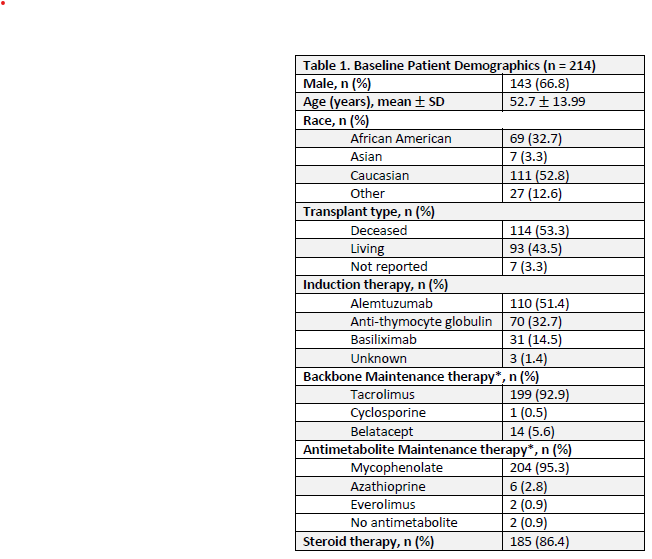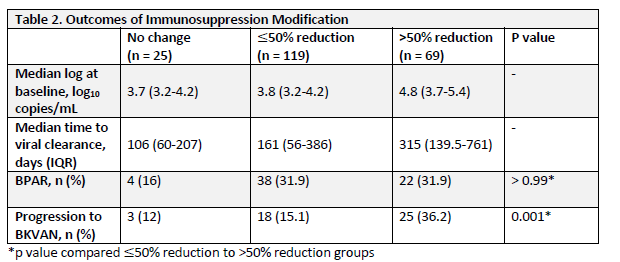Intensive Antimetabolite Reduction is Not Associated with Increased Risk of Biopsy-Proven Acute Rejection in Kidney Transplant Recipients with BK Virus Infection; a Single Center Experience
1Yale New Haven Hospital, New Haven, CT, 2Section of Nephrology, Yale School of Medicine, New Haven, CT
Meeting: 2022 American Transplant Congress
Abstract number: 1352
Keywords: Immunosuppression, Kidney transplantation, Polyma virus
Topic: Clinical Science » Infection Disease » 26 - Kidney: Polyoma
Session Information
Session Time: 7:00pm-8:00pm
 Presentation Time: 7:00pm-8:00pm
Presentation Time: 7:00pm-8:00pm
Location: Hynes Halls C & D
*Purpose: Polyoma BK virus (BKV) is a ubiquitous DNA virus that is capable of reactivation and infection in kidney transplant recipients (KTR). Manifestations of the infection may present as subclinical viremia or progress to BKV-associated nephropathy (BKVAN), which may lead to graft dysfunction or graft loss. Early detection and reduction of immunosuppression is the mainstay of BKV management, however no standardized approach is supported by evidence. The purpose of this study was to investigate BKV management strategies and graft outcomes within a single center.
*Methods: In this retrospective chart review, KTR with a minimum one year of follow up and any detectable BK DNA PCR of >3 log10 copies/mL between February 2013 to November 2020 were included. Patients with missing data, combined organ transplant, and pediatrics were excluded. Patients were screened for BKV monthly until month 6, and quarterly until 24 months after transplant. Baseline demographics, immunosuppression changes, and graft outcomes were collected.
*Results: A total of 214 patients were included. BK viremia developed at a median time of 119 days post-transplant with a median of 3.87 log10 copies/mL (3.32-4.71 log10 copies/mL). Immunosuppression reduction varied across patients, where more than half of patients received at least a 50% dose reduction. Progression to BKVAN occurred in 22% of viremic patients at a median time of 37 days after initial BKV detection. Of the diagnosed BKVAN, use of IVIG was not associated with improved viral clearance (p = 0.2257). Nearly 30% of patients developed BPAR at a median of 87 days after immunosuppression modification and 5 patients developed graft loss from BKVAN.
*Conclusions: In this cohort of KTR, variable practices in immunosuppression reduction were identified despite similar BK logs at baseline. In patients with intensive IS reduction of >50%, no differences in BPAR were observed. Intensive reduction in IS should be performed early to avoid progression to BKVAN.
To cite this abstract in AMA style:
Marvin J, Malhotra D, Jethwani P, Belfield K, Cohen E. Intensive Antimetabolite Reduction is Not Associated with Increased Risk of Biopsy-Proven Acute Rejection in Kidney Transplant Recipients with BK Virus Infection; a Single Center Experience [abstract]. Am J Transplant. 2022; 22 (suppl 3). https://atcmeetingabstracts.com/abstract/intensive-antimetabolite-reduction-is-not-associated-with-increased-risk-of-biopsy-proven-acute-rejection-in-kidney-transplant-recipients-with-bk-virus-infection-a-single-center-experience/. Accessed February 14, 2026.« Back to 2022 American Transplant Congress


